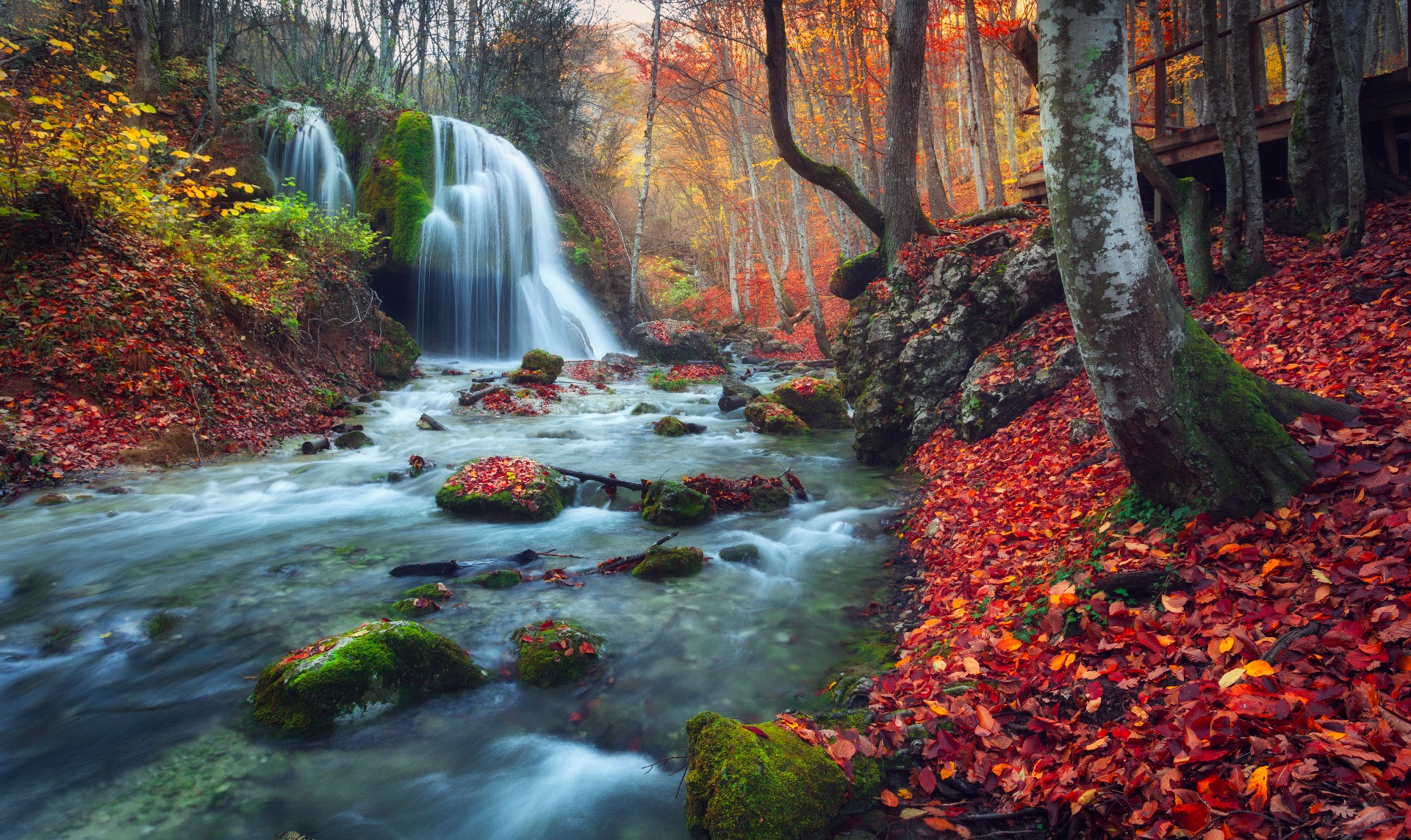
43 At Rādhā Kuṇḍa – preparing for Jala Keli
43 Thereafter, seeing Śrī Yugala Kishor and the Sakhīs' rati keli fatigue, the seva para dasis - the Mañjarīs, who are dedicated to service, escort everyone to the water's edge to commence jala keli.
Ṭīkā: The Mañjarīs are aggrieved to see Śrī Yugala Kishor and the Sakhīs' fatigue, dishevelled dresses and rati bruises. Hence, they wish to dunk everyone's limbs in the soothing waters of Rādhā Kuṇḍ. Later they will arrange their flower dresses, serve them bhojana and put them to rest in the flower mandir.Kṛṣṇa-bhavanamṛta presents the following prelude to the jala keli lila at Rādhā Kuṇḍ:
As Vṛnda leads everyone to the Kuṇḍa she says, "Hey Mādhava! These shores are the beautiful crown-jewel of all the three worlds-for they shelter your prema Vilāsa with Rādhā! So even the best poet is unfit to praise their glories!" (14.8)
Thus, Śrī Yugala Kishor arrive to curiously look from the golden saṅgama bridge bordering Rādhā Kuṇḍa and Śyāma Kuṇḍa. Then Kṛṣṇa exclaims, "Hey Raṅginī Radhe! Look at all the birds flocking to your Kuṇḍ! Usually, each species calls only in its season
- the Kokilas in the spring - Vasanta - वसनत,
- the Tiṭṭibha in the summer - Griṣma - ग्रिष्म (Uṣṇa - उष्ण),
- the Cāṭaka in the monsoon - Varṣa - वर्ष,
- the swans in the autumn - Śarada - शरद,
- the parrots in the Dew-Season -Hemanta - हेमन्त and
- the Haritas during the winter - Śiśira - शिशिर.
But
because the six seasons always maṇifest here, these birds sing together."
Kṛṣṇa continues: "Hey Vinodini Rāi! Look at the bees' mahā-Mahotsava! They're
enjoying the madhu of every seasonal flower-
- the spring's nava Mallikā,
- the summer's mridu Mallikā,
- the monsoon's Yūthikā,
- the autumn's lotus,
- the hemanta's Kuruntaka and
- the winter's Kunda flowers.
Hey Rasikā Radhe! These bees are like a householder with many wives who even though they have vowed to visit them only when they are most fertile, are constantly occupied in going from one to another.
"Oh slim-figured Radhike! The trees and latas surrounding your sarovar provide
shade, yet since they are so high, even the midday sun cannot touch the water.
"The wind softly blows through the Kuṇḍa's four entrances to beg the lotus'
fragrance. But when the bees offer rebuke with their loud buzzing, the wind
still keeps its gentle nature. Oh Rāi! Isn't a humble sage like that? When he
is cursed for begging alms, he remains gentle.
"Hey Sundari Radhe! This sarovar has all of your pleasing qualities:
- Your face resembles a blooming lotus, and your Kuṇḍa has many lotus faces.
- As your eyes are restless like minnows, this Kuṇḍa has many minnow eyes.
- Your delicate smile resembles the foam of a wave of sweetness. Similarly, your Kuṇḍa is smiling with its foaming waves.
- Oh sweetheart! You have a lalita veni, a lovely ponytail, and this sarovar has clusters of buzzing bees that are like a veni in appearance.
- Hey Mohini Rāi! Your kuca yugala look like two mating Cakravākas, and here on the sarovar sport many Cakravākas.
- "Hey beautiful-hipped Radhe! All of the auspicious rivers fill your Kuṇḍa with their ghana Rasa (meaning both water and rati keli), and you delight my mind with ghana Rasa."
Thus, Kṛṣṇa holds Rādhā's bangle-adorned hand
and smiles, and Rādhā smiles too. This tender moment is a wonder.
But Vṛnda interrupts, saying, "Hey Kṛṣṇa! The person whose ghana Rasa you wish
to bathe in, is not a sarovar, she is the high mountain of resistance. You
won't be able to enjoy her ghana Rasa now, so let her go!" Thus, Vṛnda pulls Rādhā's
hand from Kṛṣṇa's, and escorts her to another place to put on her bathing
attire. (Kṛṣṇa-bhavanamṛta, 14.17-24)
